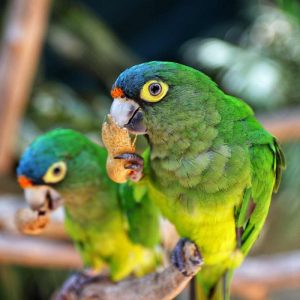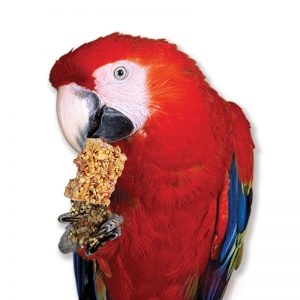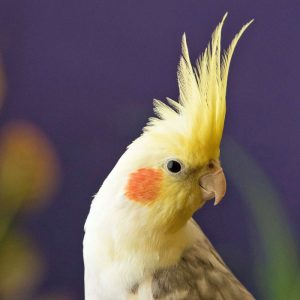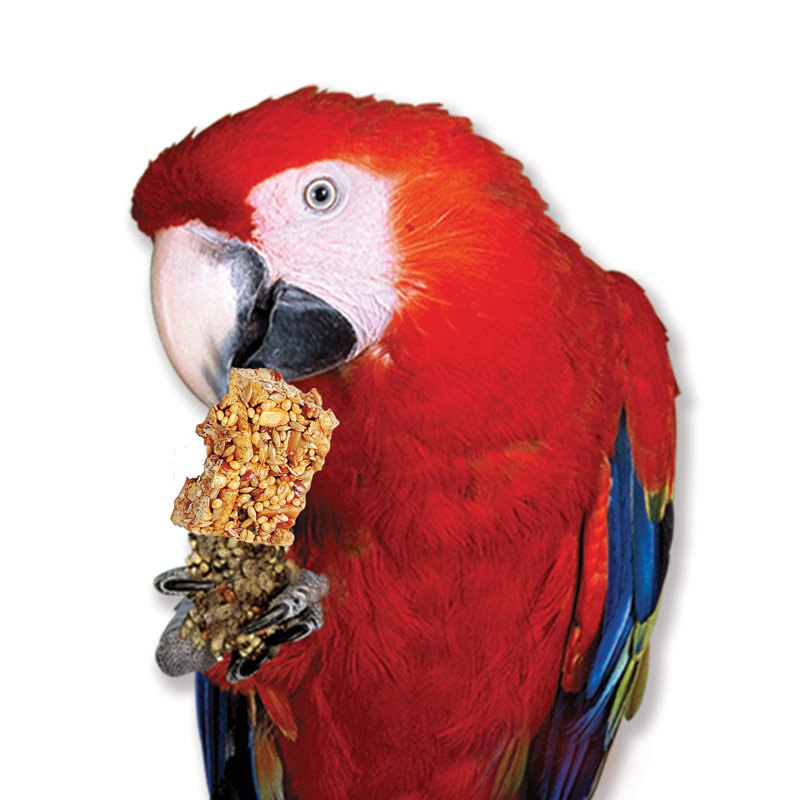
When people first started to keep pet birds in their homes, they made lots of guesses on what to feed them. Originally, people fed seeds because that is what they observed birds eat in the wild. Unfortunately, seeds were not enough and many nutritional problems ensued. This led people to start including fruits and vegetables to the diet, which helped with certain disorders. However, many pet birds were selective and picked out the food items that they enjoyed and ignored all the rest. This just further kept diets unbalanced and problematic for pet birds. Finally, pellets came on the market to solve these issues.
The Pellet Advantage

One of the great benefits of pellets is that they take away a bird’s ability to selectively eat only their favorite items out of mix. Pellets are created by taking various ingredients and mixing them together at specific amounts to form a single, combined, more-balanced food item. They can come as a pelleted cube, a crumble (Nutri-Berries), a cake (Avi-Cakes), or even a mash diet.
As pellets have become more popular among bird owners, birds are living longer and having fewer nutritional problems arise. But what is it that really makes pellets better than seeds as a dietary option? Any avian veterinarian will tell you that they see many birds come into their hospital for care because of illnesses related to poorly balanced, seed-based, diets. Let’s explore a few of these.
Bird Illnesses Caused By Nutritional Imbalance
Liver Disease
One of the most common problems veterinarians manage in pet birds is liver disease. Liver disorders arise from various causes, but one of the most common syndromes is hepatic lipidosis (fatty liver disease). Too much fat within the liver leads to inappropriate liver function. Birds who have this as a problem can show a reduction in appetite, quiet behavior, and regurgitation. The white part to their droppings can take on a greenish color. Some birds will have their beak grow quickly and be flaky when they develop a liver disorder.
Various nutritional imbalances can lead to fatty liver disease, including too high of fat in the diet, inadequate levels of protein, or a choline deficiency. All of these nutritional imbalances can be brought on by eating a seed-only diet. Eating a pellet-based diet can prevent and even be a part of the treatment plan for a bird with hepatic lipidosis.
Reproductive Disorders

Many different types of reproductive disease can ensue from a diet high in seeds. The first nutrient to consider that can cause reproductive tract disorders that seeds are deficient in is calcium. Calcium is required not only to form the shell of the egg, but it is also required for normal uterine contractions to allow for appropriate egg laying. Without adequate levels of calcium in the diet, problems like thin-shelled eggs and egg binding can occur. Also, birds pull calcium from their bones during egg laying. If they haven’t had enough calcium in the diet, then they may extract too much calcium, making their bones brittle and prone to fractures.
Another nutrient that is important for normal reproductive processes but is minimal in seed-based diets is vitamin A. A lack of vitamin A can lead to changes to the oviduct and the glandular tissues in this organ, leading to difficulties during the egg-laying process.
Additionally, seed-based diets are a very energy-dense diet due to their high fat content. Birds that have their energy demands met and anticipate an abundance of foods might be stimulated to become hormonal. Generally, unless someone is planning to breed their birds, most veterinarians recommend against encouraging hormonal drive at home. Various behavioral and health problems can occur when birds are hormonal.
Pellets provide a more balanced ratio of calcium to phosphorus and appropriate levels of vitamin A for a healthy reproductive tract. However, they are lower in their calorie content, which helps to not be as stimulating as seeds to hormonal drive.
Respiratory Problems
Respiratory disorders are another common reason birds come to a veterinary hospital. When a doctor does their physical examination on a pet bird, they may discover some changes to the respiratory system that could be linked to an underlying nutritional problem.
As previously mentioned, seeds are deficient in vitamin A. Vitamin A is important for the health of cells that line the respiratory tract. If birds are not receiving adequate levels of this nutrient, it can make the cells unhealthy. This could lead to a poor production of respiratory secretions, cellular debris accumulation, and create an environment that allows for infectious agents like bacteria or fungal organism to overgrow. This means that a bird could come in with a respiratory infection, but the underlying cause is a deficiency of vitamin A.
Ultimately, the bird not only needs to be treated for the infection it has, but it also needs its low level of vitamin A corrected.
Neurologic Disorders
Some challenging problems that veterinary practitioners encounter that can be nutritional in origin are disorders of the nervous system. Birds may present to the hospital with weakness, muscle tremors, and even seizures. Nutritional imbalances that have been linked to these problems include deficiencies in calcium and magnesium or imbalances in the calcium to phosphorus ratio. Seed-based diets are notorious for being low in calcium as we have already mentioned. They can also be high in phosphorus and result in an inappropriate calcium to phosphorus ratio. When these nutrients are out of balance it can result in neurologic problems.
Pellets are more balanced with these minerals and deficiencies in these nutrients are not common when birds are fed a pellet-based diet.
Cardiovascular Disease
An area of growing concern for avian veterinarians is cardiovascular health. A disease known as atherosclerosis is becoming more and more commonly diagnosed in pet birds. In this disease, blood vessels develop plaques of fatty and inflammatory debris, leading to a narrowing of the size of the blood vessel internally. This can result in poor blood flow to various organs and numerous signs may occur. Weakness, exercise intolerance, neurologic disorders such as wobbly walking, and difficulty breathing are all signs owners may encounter. Sadly, some birds don’t even show signs of illness and are found dead.
Although there is still a lot that veterinarians need to learn about how this disease develops, one of the current theories is that high-fat diets, such as seed-based diets, could be a contributing factor to the development of this disease.
Skin Problems
Some potentially less serious but still problematic issues that can develop from birds eating seed-based diets are skin problems. Dry, scaly skin and the development of bumblefoot has been associated with low levels of vitamin A. As previously mentioned, a deficiency in this nutrient is common with seed-only diets. Lipomas are fatty masses, typically in the skin, that have been associated with high fat in the diet.
Again, the high fat in seeds can be a contributing factor to this type of problem. Because pellets are appropriate with their vitamin A content and lower in fat, these issues are less frequently encountered in birds that eat pellets.
Doing The Best For Your Feathered Friend
Taking all these points into consideration, one can see why most veterinarians would recommend a pellet-based diet over a seed-based diet. Less nutritional imbalances and greater health are provided to birds when they consume more pellets in their diets. One of the greatest tools an owner has at home to keep their birds healthy is to feed them a proper diet; therefore, a pellet-based diet is advantageous to a seed-based diet for pet birds.
